- Home
- T. Kingfisher
Seventh Bride Page 2
Seventh Bride Read online
Page 2
That was how this was supposed to go. They had refined it to an art.
She wasn’t supposed to stand her ground and make noises.
It hissed uncertainly.
“I don’t want to do this,” Rhea said. The sandwich seemed to burn in her hands.
It took another step forward, then two. Its eyes locked on the sandwich.
“On your beak be it!”
She hurled the sandwich at the bird. The special sandwich.
The sandwich that she had spent yesterday evening carefully hollowing out, so as to contain the largest horse turd she had been able to find.
The swan snapped it out of the air and began gulping it down as rapidly as possible.
Rhea leaned forward.
Just when she was afraid that the swan’s appetite had defeated her best efforts, the bird slowed down.
It kept eating for a moment or two, apparently out of sheer disbelief, while green bits dropped from the sides of its beak. Olive streaks drooled down the white feathers. The swan hissed again, awkwardly, and began shaking its head. Bread crumbs sprayed. Rhea stepped back.
The swan’s wings drooped. It dropped its head and began frantically wiping the sides of its bill along the grass.
“That’ll teach you,” said Rhea, with deep satisfaction.
The swan turned and waddled away. It staggered into the millstream, dipping its head underwater and making odd snorting sounds one didn’t usually associate with swans.
“Hmmph!” Rhea dusted her hands off, as the gargling swan swept away out of sight.
She hadn’t wanted to hurt the swan. Sure, she could have laid hands on a pitchfork or a reaping scythe easily enough, but it just wasn’t in her nature. She cringed when her mother killed a chicken for dinner. You just didn’t bring a pitchfork to a swan fight.
Something had snapped the other day, though. She couldn’t do anything about Lord Crevan, she couldn’t do anything about getting married, she couldn’t do anything about being fifteen, but two days ago, when the swan had snagged her lunch, she’d realized that here was something she could do.
And she’d done it.
She probably couldn’t get out of marriage by feeding Crevan a horse manure sandwich, but maybe there were other options.
She turned away from the stream, her head held high.
When she caught a flash of white out of the corner of her eye, her first thought was that the swan had mounted a treacherous rear assault. She bolted to her feet, sandwich held over her head, ready to break and run.
The man in white cleared his throat.
“You’re not a swan,” she said.
He raised both eyebrows. “I’ve been accused of many things, but never swanhood.”
He wore a flowing white shirt, which had caught Rhea’s eye, and a long, sweeping blue cloak. His boots were pointed and had elegantly cut cuffs. They were not boots that had to stomp around a farmyard for a living. His hair and skin were as dark as Rhea’s own, but considerably better groomed.
Behind him, reins thrown carelessly over its neck, stood a large roan horse. Its coat shone the almost-pink of strawberry roan, and it had hooves the size of dinner plates. Rhea realized that she must have been very intent on her vengeance on the swan not to have heard the approaching hoof beats.
Oh, hell, thought Rhea, I’ve just insulted a noble. If “You’re not a swan,” is really an insult, which I’m not sure about.
“Err,” she said.
“Sorry,” she said.
“I wasn’t expecting…” she began, and then realized she was very close to babbling and clamped her teeth together.
“Neither was I,” he said agreeably. “I am Lord Crevan.”
Ah. Yes. Of course. She felt very stupid for not having guessed, but of course the odds of two nobles stopping by to talk to her were…well, actually not that much lower than the odds of one noble talking to her, and here he was and dear god, he was old, he was at least as old as her father and she didn’t want to marry him and—
Easy. First things first. Don’t just stand here and stare at him as if he were a viper.
She dropped a curtsey, remembered too late that she was wearing breeches, and had to make do. Damn.
“I’m Rhea. The, uh, miller’s daughter. My lord.” Your fiancée, but we won’t talk about that.
“A pleasure to meet you,” he said, inclining his head.
They stood in awkward silence for a moment. Rhea’s hands were sweating, and she tried to rub them unobtrusively on the sides of her legs. He was studying her closely, and she was acutely aware of her coating of flour dust, and the mud coating one foot, and the ring around her left ankle where the flour had met the mud and hardened into a grey paste.
“Have you given any thought to my proposal?” he asked, as calmly as if he was asking for a bag of flour, and not for the rest of her life.
“Errrr,” she said.
Young women married much older men all the time. It happened a lot. Childbearing was dangerous business, and there were a lot of widowers out there. There was nothing unusual about it.
So why was she so convinced that this was wrong?
“You have a choice,” said Crevan.
She should tell him no. If she told him no, he’d go away. It would all have been a mistake. Aunt would never forgive her, but Aunt never forgave anything. She still hadn’t forgiven Rhea for giving a beggar a loaf of bread five years ago, and brought it up on special occasions.
Rhea opened her mouth, and her father came around the side of the building.
“My lord!” he said. “My lord, I saw your horse—forgive me, can we offer you any refreshment? Wine or ale?”
“No, indeed,” said Lord Crevan, nodding to the miller. “I was just making the acquaintance of your daughter, in fact.”
“Ah—er—yes,” said her father. “This is Rhea, then.”
Rhea was slightly gratified to see that she wasn’t the only one who babbled in front of the lord, but she still wished he wouldn’t. He was her father, after all, and the miller, one of the most respected men in town. She wanted him to do better.
“Well?” asked Lord Crevan, a smile playing around his lips.
It took Rhea a moment to remember what he had asked, and then her heart, already sinking, seemed to settle in her toes.
“I—uh—I’m not sure—”
The smile deepened. Rhea shot her father a pleading look.
“She’s very flattered by yer offer, my lord,” said her father firmly.
“Is she?”
Rhea felt like a mouse caught in the mill gears. No matter what she did, they were going to grind her to bits. “Yes, very flattered,” she said faintly.
“I am certain she will be worth it,” said Crevan, and held out a hand.
Automatically, she held hers out to shake, and instead he caught it.
He looked at the silver ring on her finger—the engagement ring, the ring that said Rhea was now his—and he smiled.
Then he brought her hand to his lips, and kissed the back of it.
Rhea watched this with the expression of someone who has just been handed a dead flounder.
She had read about hand kissing. She knew it happened. It had always struck her as sort of romantic, and yes, she’d had a few daydreams about meeting a man who would kiss her hand, and it would be like a lightning bolt through both of them, and then he’d tell her that he was really a prince wandering the land in search of the maiden of his heart, and now he’d found her, and he would sweep her off her feet and take her back to his castle and she would never have to help dig an outhouse again.
Rhea’s imagination tended to get a little fuzzy after the bit where they got back to the castle, but was very clear about the outhouses.
But this…this was not like a daydream.
It wasn’t that he slobbered or anything, but it was rather desperately embarrassing. It was wrong. Lords do not ride up on giant roan horses and kiss the hands of miller’s daughters. Well, sometimes they did
, but only ravishingly beautiful miller’s daughters, like the ones in the stories, who were brave and true and fair. Rhea figured she was one for three on that list, since she mostly didn’t lie unless it was really important. You probably couldn’t count “brave” for someone who lived in terror of swans.
She wanted to pull her hand away, but she didn’t, because even if lords don’t do things like this, miller’s daughters definitely didn’t snub lords.
It didn’t feel romantic. It felt like that moment in a conversation where someone has just said the wrong thing, and everyone is standing around trying to figure out how to gloss it over and get past it. She felt embarrassed for everyone involved—for the lord, for herself, and for her father, who was watching all this.
And then a spark jumped to her fingers, or something that felt like a spark. She twitched, and stared stupidly down at her hand, and when she looked up again, Crevan was smiling.
It was a smug smile. Rhea didn’t like it at all.
“I’ll send for you,” said Lord Crevan, and turned away to his horse.
Miller and miller’s daughter stood and watched him ride away. The horse was ridiculously pink in the afternoon light, and kicked up puffs of dust from the road.
“A fine gentleman,” said her father, nodding to her. “You see?”
Rhea looked down at her hand. It looked perfectly normal, but there was a nasty tingling at the fingertips. She felt like her hand had fallen asleep.
It faded almost as soon as she noticed it. The sensation lingered longest around the silver ring.
She shook her hand once or twice, and then it was perfectly normal again.
“Huh,” she said, and could think of nothing more to say.
CHAPTER FOUR
The basics of milling went like this: there was a waterwheel, and as the stream flowed by, the current turned the waterwheel, which turned another wheel on a shaft, which turned a few other things hooked together, which ultimately turned a millstone. The millstone was very large and very heavy and set onto another stone, and if you dumped grain under it, it would grind the grain into flour.
The millstone was quite indiscriminate and would also grind your fingers, toes, and other available bits of anatomy into flour. In order to cut down on the loss of extremities among millworkers, the grain was dumped into a hopper, which fed to the grinder through a sloped trough.
Rhea’s father ran the mill, and watched the various complicated turning bits to make sure nothing broke. He oiled things and occasionally replaced other things. He collected the milled flour into sacks, and twice a week, he loaded the sacks into his wagon and drove the flour around to the farmers who owned the grain.
Rhea’s aunt, who had the eyes of an eagle and the heart of a miser, supervised the weighing out of the grain.
Rhea’s mother, who had a fine, neat hand, noted down the weights of each sack of grain, and who it belonged to, and who had paid for milling and who hadn’t.
Rhea’s job, which was utterly boring, was to thump the trough every few minutes to make sure the grain was sliding down at the proper rate, and to make sure the hoppers didn’t jam.
Where you got a lot of grain, you got a lot of mice, and where you got a lot of mice, sooner or later, you got dead mice. It wasn’t as bad as it could be, but every now and then a dead mouse would fall in one of the hoppers and somebody with small hands had to reach way down in there and pull it out, or the whole system would back up. This was not a pleasant job, but at least it wasn’t a regular one. No more than a few times a week. Really.
Anyway, you cooked bread before you ate it, so if there were some little mousey fragments ground in with the flour, it wasn’t like it would hurt anything.
A couple of times a year, a gremlin would get into the mill. The mechanisms, with their big grinding gears and turning wheels and rotating shafts, were irresistible to gremlins. They looked more or less like big mice wearing little tool-belts, and it wasn’t until you actually caught one stuck in the hopper and hauled it out that you saw the mouth full of small pointed teeth and the stubby little hand on the end of the tail.
Unlike the mice, gremlins really were a problem. If you ground one into flour on accident, the bread had a tendency to explode in the oven, or bleed when you cut into it, or turn into a flock of starlings and tear around the cottage shrieking, and then people came around and had words with the miller, many of which had only four letters and involved hand gestures.
So as soon as you caught a gremlin, or heard them giggling together in the rafters, you had to run quick to the conjure wife, who lived outside the village in a hut that looked like it had been assembled from the less desirable bits of a goat.
The conjure wife kept a flock of bone-white quail, and when you’d told her your problem, she’d send you out to the yard to catch one. Then she’d wring its neck, clean it, tie the bones and the feathers up in a little bag with a few herbs, and send you home with it. It looked the same every time, a grisly little package topped with a quail skull, no matter what the problem was—fever or gremlins or fits, cows not giving milk or goats getting the staggers, or potatoes hauling themselves out of the ground and sulking in the corner of the field. (Potatoes were, for some reason, more prone to fits of random magic than most other vegetables. It would take a remarkable magic to affect turnips or kale. No one bothered planting eggplant—it’d be off and running into the woods or flying away on a leafy kite as soon as your back was turned.) But the conjure woman’s quail-charms worked, every time. You hung the sad little package in the doorway, and pretty soon, there wasn’t a gremlin anywhere to be found.
Gremlin infestations were rare excitements. Mostly, Rhea thumped the grain trough, and occasionally checked the hoppers for mice.
This occupied her hands, but left her mind entirely free. She spent a lot of time thinking, and this week had been no exception. She had a lot to think about, and even if the world had been turned upside down, the flour still had to get milled.
That was actually one of the things she thought about. It did not seem fair. She was unwillingly engaged to a strange man. A strange man who had kissed her hand and ridden away on a big pink horse. That this could take place in a world that still, stubbornly, included flour sacks and grain and millstones and dead mice seemed like a poor job of management. She could understand why people didn’t have much truck with gods.
Saints didn’t seem to be much more help. She tried praying to the Lady of Stones—even stretched down and trailed her fingers along the millstone as she did it, since if you held a stone while you prayed to her, it made the prayers work better—and then waited all day for word to come that Lord Crevan had fallen off his horse and broken his neck. It didn’t happen. In fact, she saw him riding that evening, far off across the hillside, on the unmistakable roan horse.
So much for prayer, then. What was the point of saints that wouldn’t kick someone off a horse when you asked them to?
“Feh,” muttered Rhea, and thumped a fist into the trough, making the kernels rattle. “Stupid lord. Stupid saints. Stupid pink horse.”
Suppose he was a magician.
This was the main thing that had occupied her thoughts.
Suppose that odd tingle in her hand had been magic. It hadn’t seemed like static, and the way he had smiled—no, she’d have laid money he was responsible for it.
Well, and what if he was? There was nothing inherently wrong with being magicky. Every village had its conjure wife, who could do the little charms and simple spells and take down any stray bits of magic that made mischief. Barrelridge, forty miles away, even had a clockmaker who was a ratspeaker, and they said his clocks were the best because he gave his familiars tiny tools and they made gears and mechanisms too small for human hands.
And lots of people could do little things, whether from a few drops of magician’s blood, or from having gotten in the way of a bit of loose magic. Her friend Susannah, whose mother ran the inn, could tell if beer had foxed while it was still in th
e keg. One of Rhea’s cousins could call frogs, which wasn’t much good unless you had far too many insects in the garden, although she’d been a terror as a small child.
One of her other cousins had an extra toe, but there was probably nothing magical about that.
It wasn’t that anyone looked down on magicians, but—well, you wanted to know where they were. It was fine to be magicky, but if you were, and you hid it—that was suspicious.
Magic didn’t make you a bad person, but it didn’t necessarily make you a good one, either. People got antsy when you had a power they didn’t have.
And if Lord Crevan was a magician, he really should have said something before getting engaged. That was a lot more significant than having an extra toe.
Maybe that was his way of saying something. Maybe he was letting you know—you, and not your father.
This thought alarmed her enough that she missed her next swipe at the trough and banged her knuckles on the hopper instead. The silver ring went “clink!” as it struck.
“Ow!”
She rubbed her sore knuckles and thumped the trough with her shoulder instead.
Well. Suppose he was a magician?
Rhea stuck a knuckle in her mouth and considered.
Well. Suppose he was.
It seemed like it should matter. It seemed like it should matter a lot.
More grain thumped down into the hopper.
Reluctantly, she decided that it didn’t.
If she went to her parents and said “Hey, I think Lord Crevan is a magician!” they would look at her and say “Well, isn’t that nice?” and absolutely nothing would change.
“I bet he’s not a nice magician,” she said aloud, while the mill machinery ground on around her. “I hope he’s not like the conjure wife.” The conjure wife was nice enough, but she was more than a little mad, and while you were glad to have her around the village, you certainly wouldn’t want to marry her.
“The term is sorcerer,” said Lord Crevan from the doorway, raising his voice to be heard over the machinery. “And I am nothing like the conjure wife.”
Rhea yelped, flung herself backwards, and very nearly fell off the ladder. She got one arm hooked through it, and that brought her up short while her feet slithered down the rungs. Fortunately the ladder was bolted down, like everything else in the mill, or she would have fallen off and probably broken her neck.

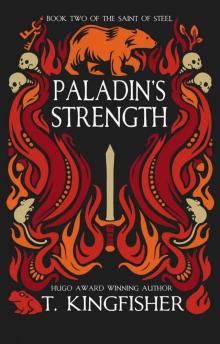 Paladin's Strength
Paladin's Strength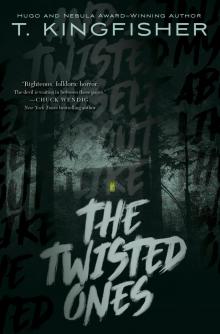 The Twisted Ones
The Twisted Ones The Hollow Places
The Hollow Places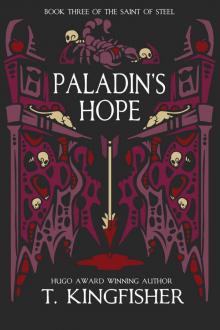 Paladin’s Hope: Book Three of the Saint of Steel
Paladin’s Hope: Book Three of the Saint of Steel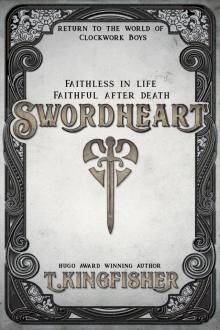 Swordheart
Swordheart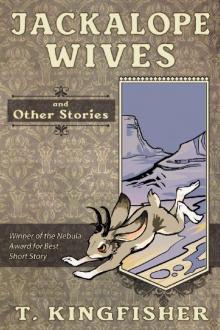 Jackalope Wives And Other Stories
Jackalope Wives And Other Stories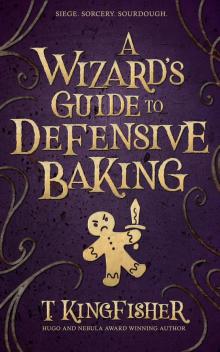 A Wizard's Guide to Defensive Baking
A Wizard's Guide to Defensive Baking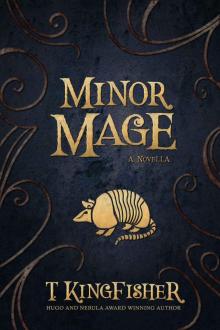 Minor Mage
Minor Mage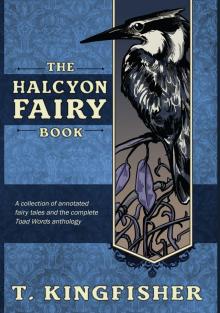 The Halcyon Fairy Book
The Halcyon Fairy Book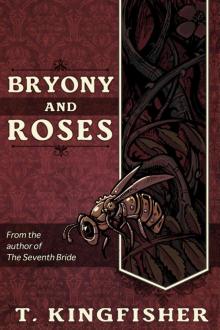 Bryony and Roses
Bryony and Roses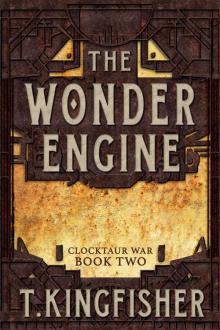 The Wonder Engine_Book Two of the Clocktaur War
The Wonder Engine_Book Two of the Clocktaur War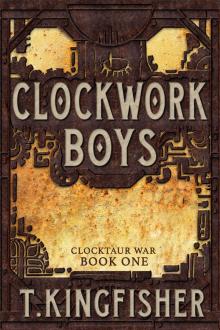 Clockwork Boys: Book One of the Clocktaur War
Clockwork Boys: Book One of the Clocktaur War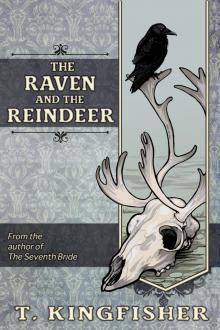 The Raven and the Reindeer
The Raven and the Reindeer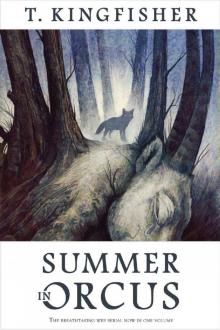 Summer in Orcus
Summer in Orcus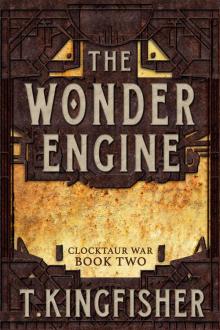 The Wonder Engine
The Wonder Engine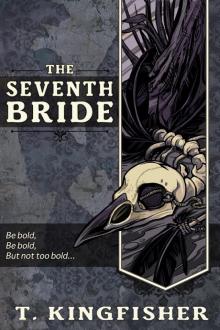 Seventh Bride
Seventh Bride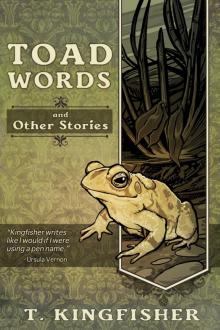 Toad Words
Toad Words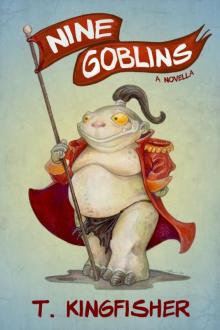 Nine Goblins
Nine Goblins